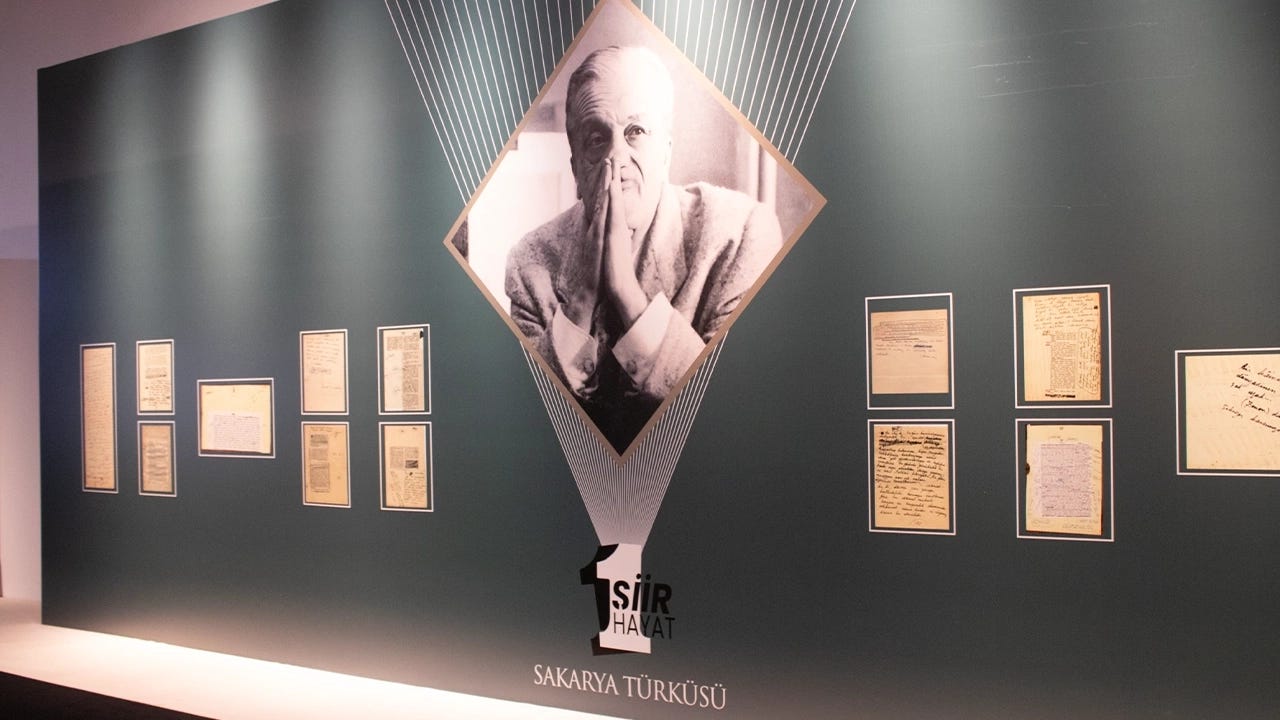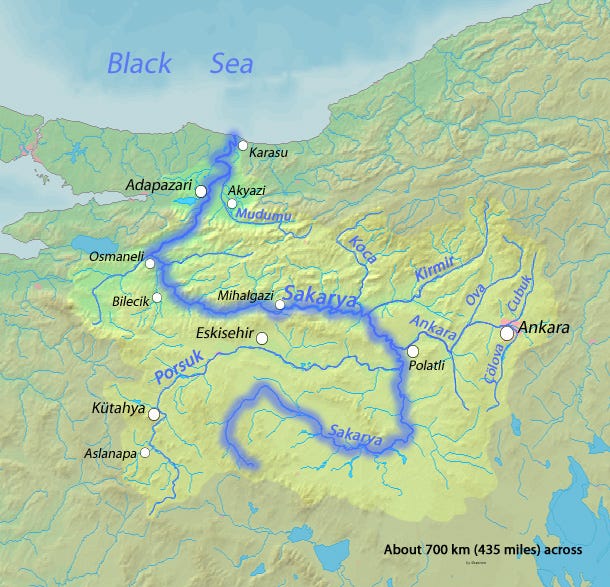
Longtime readers of Kültürkampf will remember my post about the poet Necip Fazıl Kısakürek. He was a major force on the far-right from the 1960s onward, and shaped the thinking of the Islamist and to a lesser extent, pan-Turkic nationalists.
Today I thought I’d try my hand at translating what is perhaps Necip Fazıl’s most famous poem: Sakarya Türküsü. He calls it a “türkü,” which is how one refers to folk songs in Turkish, but “The Sakarya Song” or “Sakarya Ballad” just don’t do it for me, so I left the title as is.
First some historical context: Sakarya is the Anatolian province a couple hours’ drive from central Istanbul, and there’s an eponymous river that flows through it.

In the summer of 1921, during the war of independence, Turkish and Greek forces fought a battle here that tipped the balance in Turkey’s favor.

So the battle of Sakarya represents national resistance in a seemingly precarious moment, when things could go either way. It’s the hail mary pass, the darkest moment before dawn, etc.
When writing this poem in 1949, Necip Fazıl felt enveloped in such darkness. Turkey had beaten the West in the war of independence, yes, but it had capitulated its soul right afterwards. The Kemalist regime, Necip Fazıl thought, was a disaster. Turkey was ruled by an elite that rejected the spiritual core of its own people, which of course, was the cosmic truth of Islam. In the poem, the river represents the enduring purity at the heart of the nation. Necip Fazıl writes that the spirit of Sakarya will rise again, defeat the Kemalists and restore Turkish greatness.
Below is the poem. As usual with these things, I’ve focused on meaning, and was not able to preserve rhyme. I like to think that some of the cadence is still there though.
Sakarya Türküsü
This is humanity, like water, it flows bend by bend;
I flow on one side, Sakarya on the other.
Water keeps descending the hill, step by step;
The writing on my forehead [my destiny] is to thirst on the slopes.
Everything flows, water, history, stars, people, ideas;
There are two gutters; light flows from one, dirt from the other.
All creation, great and small, unites in flow;
Behold the ascending cloud, in defiance of the descending water!
But Sakarya is different, is it going up a hill?
A leaden weight has mounted its foam body;
It is aching, scrambling to clamber to the top,
O Sakarya, who said that water cannot be shackled?
If my Lord wants it, the waters will part, bend by bend,
On Sakarya’s back, Turkish history will be hauled.
Alas, alas, my Sakarya, has this burden fallen on you?
This cause is wretched, this cause is orphaned, this cause is great!..
-
How heavy your trial is, Sakarya!
How does the canary carry the eagle of a thousand and one heads?
-
I thought man was the barer of the sacred burden.
A labor that ends in neither rank nor wealth,
Only a bitter bite, food cooked with poison;
And separation, from mother, homeland, and friend.
Now strive Sakarya, it is the moment to strive;
Remember the old suns that fled to the outer reaches of the galaxy!
Remember Yunus Emre, who was strolling on your shores,
Remember that army that sprinkled [mosque] domes in its wake?
Where are your siblings, the generous Nile, the green Danube,
When will the glorious akıncı [raider] return home?
Does the takbir still beat in the pulse of the marble?
Does the wild wind find that tune: God is one!
All this is with you, these intricate riddles,
Sakarya, the night has downed the beacons in tar.
-
Like torments of conscience, boil, boil Sakarya,
A stranger in your native land, a pariah in your homeland!
-
Man is a few drops of blood, rivers are a few drops of water;
We've run into a life, that waits in ambush on life.
The mortal lie has arrived, the immortal truth has gone;
You, living carcasses, who will resurrect you?
If they hung Mount Qaf on a hair, perhaps it would hold!
The mind will not hold, even a hair of this demonic question!
Sakarya; the pure child of innocent Anatolia,
Only we two are left, obsessed with the way of God!
You and me, are of dough wet with tears;
Behold our color, we are of mud and blood!
Fate has given birth to us in the scorpion's claw;
Never mind, such is this world, and such it will be!
The bed is my shroud, the pool is your coffin;
You flow, I go, the Last Prophet is the Guide!
-
The path is his, being is his, all else is drudgery;
You have crawled face-down too long, stand up, Sakarya!
I’ve expanded a bit below (for paid subscibers) on how the poem lives on in Turkey today. I’ve also dipped a little bit into my family’s history.
Keep reading with a 7-day free trial
Subscribe to Kültürkampf to keep reading this post and get 7 days of free access to the full post archives.




